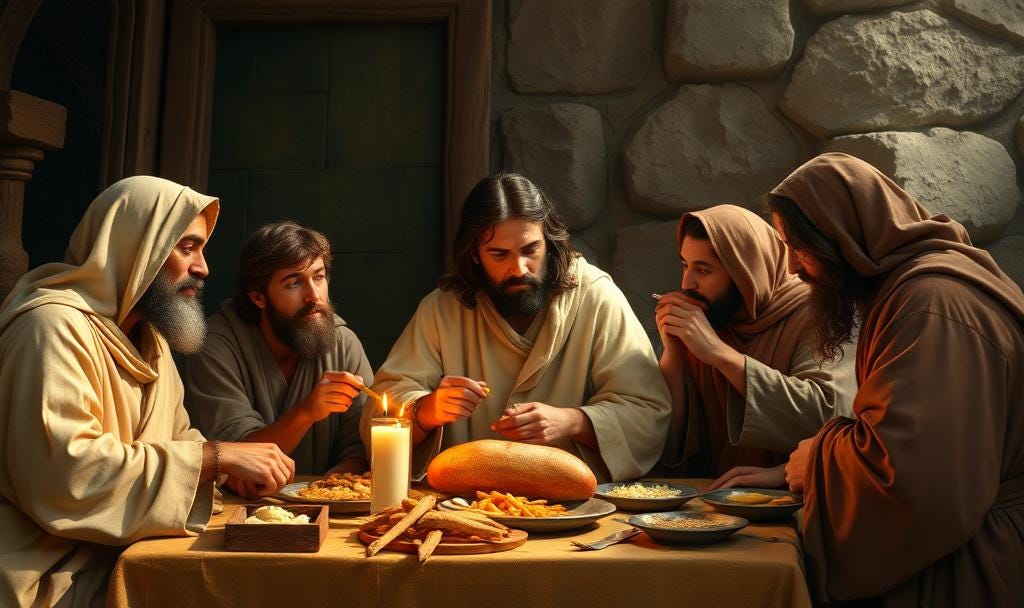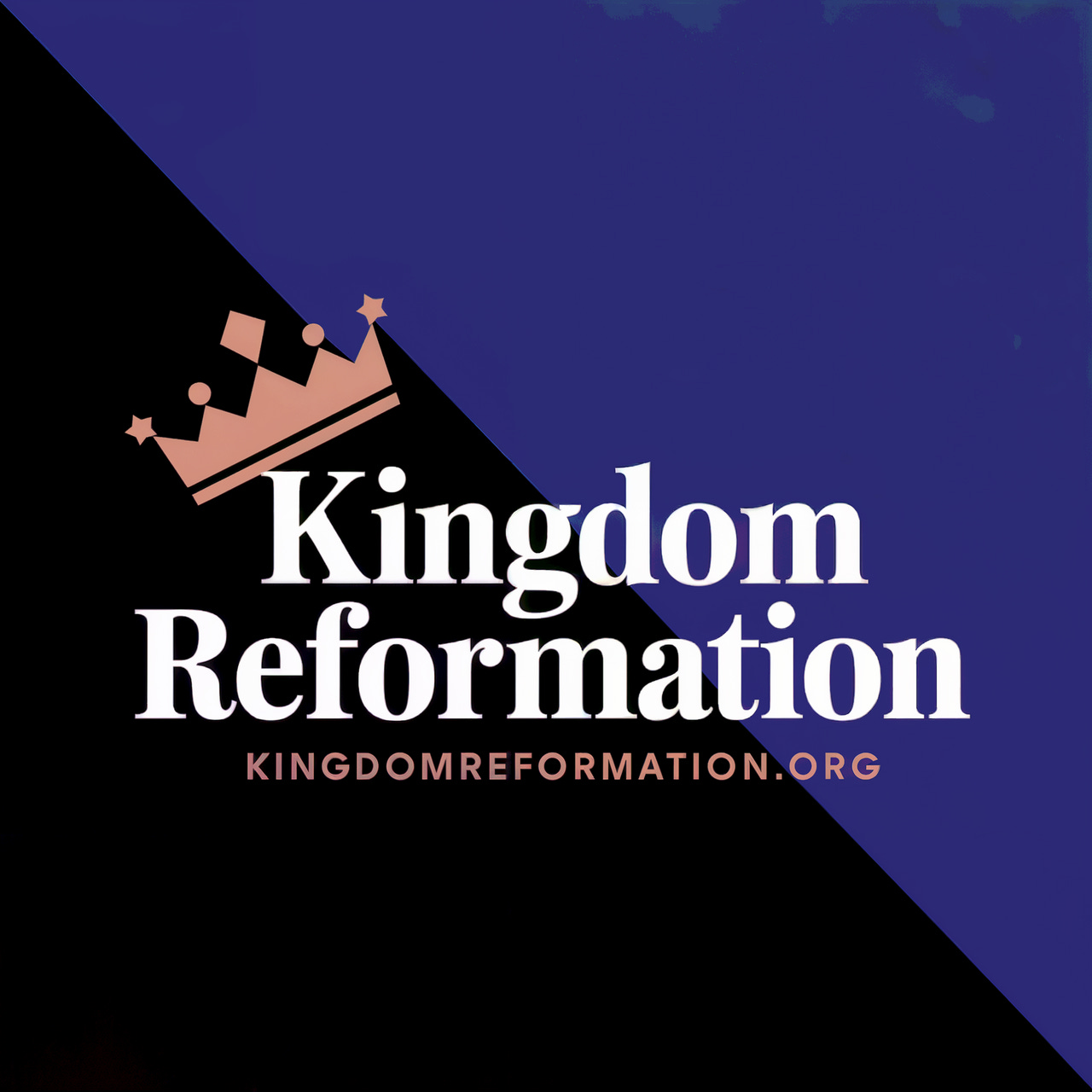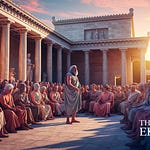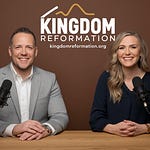Return to Cruciform Leadership: A Conversation with Dr. Mark Chironna
In an age of celebrity pastors and consumer Christianity, Dr. Mark Chironna issues a profound call to return to Jesus's model of servant leadership—a timely message for a church caught between cultural captivity and authentic kingdom witness.
During a recent Kingdom Reformation session, Dr. Chironna shared insights from his five decades of ministry on how Western Christianity has drifted toward corporate models that reflect America more than Christ.
His analysis offers both diagnosis and prescription: a return to the ancient paths of Jesus-centered, cruciform ministry.
📺 Want to experience the full depth of this transformative conversation? Become a paid subscribe to access the complete video and join a community committed to authentic kingdom leadership.
The Distorted Waters We Swim In: Enlightenment's Long Shadow on Christian Consciousness
Dr. Chironna began his presentation with a powerful metaphor that set the stage for understanding our cultural blindness. "Imagine I'm Dr. Doolittle and I dive into the ocean near Kulangatta where I meet two great white sharks who are personal friends. Every time I see them, I ask, 'How's the water?' And they always respond, 'What water?'"
This, he explained, illustrates how we've been swimming in "enlightenment waters" for over 400 years, unconsciously shaped by rationalism that exalts the logical mind above all else. Just as fish are unaware of the water they swim in because it constitutes their entire environment, so Western Christians often fail to recognize how thoroughly our thinking has been shaped by Enlightenment philosophy.
"From the time we're born, we're shaped and formed by enlightenment thinking," he noted, highlighting how Descartes' assertion of "I think, therefore I am" fundamentally contradicts the Christian understanding of our existence. This philosophical shift—from understanding ourselves as creatures whose very being is a gift from God to autonomous individuals who validate their own existence through reason—has had profound implications for theology, ministry, and church leadership.
"You don't exist because you think," Dr. Chironna emphasized. "You exist because you were loved into being by the God who exists himself. You only exist because He exists." This fundamental philosophical shift has profound implications for how we understand ourselves, God, and the nature of reality itself. When we begin with human rationality rather than divine revelation, we inevitably construct theological systems and leadership models that elevate human wisdom over divine mystery.
The consequences of enlightenment thinking have been the elevation of rationalism above all else and the development of what Dr. Chironna called "the doctrines of devils" – scientism, objectivism, pragmatism, and relativism. These philosophical movements have so thoroughly permeated Western society that even believers often don't recognize how deeply they've been influenced by them.
"We live in a disenchanted world," Dr. Chironna observed, "and that disenchantment has pervaded life, even the church." The rationalistic approach to faith has stripped away the sense of mystery, wonder, and transcendence that characterized pre-Enlightenment Christianity, replacing it with systematic theologies, strategic church growth plans, and leadership principles borrowed from the corporate world.
Dr. Chironna referenced the work of Ian McGilchrist, the psychiatrist and neuroscientist who wrote "The Master and His Emissary" (2010), which explores how Western society has become dominated by left-brain thinking at the expense of the right-brain's intuitive and creative function. "The master is, in fact, the right brain, the intuitive, creative side of our being that God intended to be the master. But the script has flipped because of enlightenment thinking, and now we have become slaves to rationalism."
McGilchrist's work provides a neurological perspective on what many spiritual thinkers have recognized: that Western culture's emphasis on analytical, categorical thinking has come at the expense of intuitive, holistic understanding. This shift has profound implications for Christian spirituality, which historically embraced both intellectual rigor and mystical experience, both systematic theology and contemplative prayer.
The result, according to Dr. Chironna, is a "disenchanted world" where even Christians have lost the ability to perceive reality as our pre-enlightenment ancestors did. "We look up at the night sky and what we see is outer space. Thank you, enlightenment, that you taught me to see that as outer space. But if you were born before the enlightenment, you looked up and you saw the heavens and you knew the heavens were declaring the glory of God."
This disenchantment doesn't just affect our view of nature but also our understanding of scripture, worship, community, and leadership. When the Bible becomes merely a text to be analyzed rather than the living Word that analyzes us, when worship becomes a production to be critiqued rather than an encounter to be experienced, when church becomes an organization to be managed rather than a body to be nurtured, we have succumbed to what sociologist Max Weber called "the disenchantment of the world."
From Religion to Spirituality: William James and the Redefinition of Faith
Another consequence of enlightenment thinking has been the redefinition of spirituality itself. Dr. Chironna highlighted how William James, the father of American psychology and son of a New England transcendentalist, fundamentally altered how we understand spirituality through his influential work "The Varieties of Religious Experience" (1902).
"If you ever hear someone say, 'I'm not religious, I'm spiritual,' that's William James. And it's balderdash," Dr. Chironna stated with characteristic directness. "The word 'religio' means to bind in the best way, not in the ugliest way. We toss around terms like 'religious spirits' as if we know what we're talking about, not realizing that the moment we as professing Christians claim we're not religious, we're spiritual, we're actually denying what pure religion and undefiled is all about."
This linguistic shift from "religion" to "spirituality" represents more than mere semantics; it reflects a fundamental reorientation from communal faith anchored in tradition to individualistic experience detached from any particular faith community. James' work, while valuable in many respects, helped lay the groundwork for the privatization of faith that characterizes much of contemporary American spirituality.
Dr. Chironna continued, "To be bound to the triune God is what 'religio' means – to be bound in the best way to the God who is Father, Son, and Spirit. And the story of scripture is the story of how God progressively reveals himself to us and ultimately fully speaks to us in his Son." This understanding of religion as relationship – a binding to God that liberates rather than restricts – stands in stark contrast to the negative connotations often associated with religion today.
Before William James, Dr. Chironna explained, you couldn't talk about spirituality without referencing the Holy Spirit. The very concept of spirituality was intrinsically connected to the third person of the Trinity. Now, spirituality has become disconnected from its Christian roots, allowing for a self-defined spirituality that requires no commitment to Christ or his body, no accountability to community, and no conformity to any tradition outside one's own preference.
This shift has profoundly affected church leadership as well. When spirituality becomes primarily about individual experience rather than communal formation, leadership naturally shifts from shepherding to providing experiences, from forming character to facilitating feelings, from building community to building platforms.
The McDonaldization of the Church: Fast Food Christianity in a Consumer Culture
One of the most striking aspects of Dr. Chironna's analysis was his exploration of how consumer capitalism has transformed the church into what sociologist George Ritzer termed "McDonaldization" in his 2002 book, "The McDonaldization of Society." This concept provides a powerful lens for understanding how the values of the fast-food industry have infiltrated nearly every aspect of modern life, including the church.
"We've turned the church into a franchise based on consumer capitalism, and we serve spiritual fast food," Dr. Chironna lamented. "And we have no real desire to do more than that." He explained how the church has unconsciously adopted the McDonald's corporate values of efficiency, calculability, predictability, and control – values that may work well for hamburger production but distort the organic, relational nature of authentic Christian community.
"Those four things – efficiency, calculability, predictability, and control – have become the way in which every corporation has moved since Ray Kroc hijacked the McDonald brothers and ripped them off," he explained. In the church context, efficiency means streamlining services to maximize attendance with minimal demands on time; calculability prioritizes quantifiable metrics like attendance and giving over qualitative spiritual growth; predictability ensures that church experiences are standardized across locations and times; and control manages both the environment and the participants to ensure consistent outcomes.
These values, designed to maximize profit and standardize production, have little to do with the organic, relational nature of authentic Christian community. Yet they have become the implicit values driving many church growth strategies, leadership conferences, and ministry models.
This trend was further examined in John Drane's book, "The McDonaldization of the Church" (2012), which warned about how these corporate values were distorting authentic Christian ministry. Dr. Chironna reflected on how academic institutions training pastors have been influenced by money and power, with "big power brokers" wanting their children to learn how to be CEOs of large churches rather than shepherds with theological depth.
"Money answers all things," Dr. Chironna said, describing the American seminary landscape. "The big power brokers that were sending their kids to school didn't want their kids to learn theology. They wanted them to learn how to be CEOs and build big churches." This shift in pastoral education from theological formation to organizational management reflects the broader cultural shift from ministry as vocation to ministry as profession, from church as community to church as corporation.
Dr. Chironna shared from his own experience as a pioneer of two churches, including one in Raleigh, North Carolina, that grew to nearly 2,000 people in the late 1990s. Despite leading what was considered a "mega-church" at that time, he resisted the church growth model. "Our statement of faith was the Nicene Creed. We had the Eucharist every Sunday in the middle of worship," he recalled, noting that services would often last three and a half to four hours, with a full hour spent at the communion table.
"Back in those days, you didn't have church if you didn't gather for at least three and a half hours," he remarked with a hint of nostalgia. "We would start at 9:30. We would go to 1:30. And then if we had an altar call, that guaranteed we'd be in church at least till 3:30 or four laying hands, praying." This kind of extended, unhurried gathering for worship, teaching, communion, and ministry stands in stark contrast to the efficient, carefully timed services of many contemporary churches.
He contrasted this approach with the current climate where churches have adopted shorter services and entertainment-focused gatherings to accommodate consumer preferences. "The culture has changed," he acknowledged, while suggesting that something profound has been lost in the process – the depth of communion, the space for the Spirit to move, the formative power of extended time in God's presence.
The Leadership Industry: How Business Models Hijacked Ministry
Dr. Chironna referenced Barbara Kellerman, whom he described as "the leading guru on the leadership industry in the Western world," who wrote "The End of Leadership" in 2012. Her work exposed the failure of leadership and the leadership industry, which now generates $367 billion annually worldwide.
"We have a leadership fetish," Dr. Chironna stated, "We literally have a leadership fetish that has nothing to do with Jesus." He noted that prior to 1959, the term "leader" didn't appear in Christian books in relation to pastors. This historical observation is significant – for nearly two millennia of church history, those who cared for God's people were referred to as pastors, shepherds, elders, bishops, and ministers, but rarely if ever as "leaders" in the contemporary sense.
"Jesus, as Len Sweet, one of my dearest friends and one of the most significant mentors in my life... refers to Jesus as the quintessential unleader for a thousand and one valid reasons," Dr. Chironna explained. This concept of Jesus as an "unleader" challenges the dominant paradigms of leadership that emphasize power, authority, visibility, and control. Jesus consistently undermined these paradigms through his teaching and example, modeling a form of influence based on service, sacrifice, and submission.
This emphasis on leadership has created what Dr. Chironna called "toxic systems" where "toxic leaders go together," resulting in the collapse of authentic Christianity within many circles. The proliferation of leadership books, conferences, and coaching programs has contributed to a professionalization of ministry that often values skills over character, results over relationships, and success over faithfulness.
Dr. Chironna criticized the growing trend of pastors who can preach for 30 minutes without ever mentioning Jesus, focusing instead on self-help messages or politically-charged rhetoric. "I hear a lot of folk preach everything else but Jesus. You won't hear Jesus mentioned in, they'll go 30 minutes and not mention Jesus. So Christ isn't even preeminent in their thinking."
This Jesus-deficit in contemporary preaching reflects a broader shift from gospel proclamation to therapeutic moralism or political activism. When Jesus is no longer central to the message, Christianity becomes just another form of self-improvement or social reform, losing its distinctive power to transform lives through the good news of God's grace in Christ.
Dr. Chironna was particularly critical of movements that conflate Christianity with nationalism, describing them as "a heretical trend, has nothing to do with Jesus, but everything to do with populism and nationalism." He was emphatic: "The moment you wed empire, Caesar, with Jesus, you're already in dangerous, dangerous waters and don't know where you're swimming. Jesus says to Pilate, 'My kingdom is not of this world.'"
This warning against the politicization of the faith echoes the concerns of theologians like Stanley Hauerwas and William Willimon, who wrote in "Resident Aliens" about the dangers of the church being coopted by political ideologies. When the church aligns itself with political power – whether on the right or the left – it inevitably compromises its prophetic witness and its distinctive identity as an alternative community shaped by the values of God's kingdom rather than the values of the nation-state.
The Crisis of Theological Shallowness: When Pastors Can't Talk About Jesus
Throughout the conversation, Dr. Chironna repeatedly touched on the lack of theological depth in contemporary Christian leadership. He shared a story of sitting with a mega-church pastor who was embracing "hyper grace" theology. When Dr. Chironna asked if he had ever read Augustine's Confessions, the pastor responded with dismissive indifference: "What would Augustine have to say to me today?"
"That's your problem," Dr. Chironna replied with a directness born of genuine concern. "If you have never sat with St. Augustine and walked through his confessions, you have no business being a pastor of a church. He's got big numbers, but he is as shallow as a drop at the bottom of a little eight-ounce cup of water."
This exchange illuminates a broader crisis in pastoral formation – the disconnect from the great treasury of Christian thought that has shaped the church's understanding of scripture, God, and the spiritual life for two millennia. When pastors are unfamiliar with Augustine, Athanasius, Gregory of Nyssa, Thomas Aquinas, Martin Luther, John Calvin, John Wesley, and other theological giants, they are cut off from the very roots that nourish the tree of faith.
This theological shallowness extends to fundamental Christian doctrines. "I would argue that the majority of pastors couldn't even talk for a half hour on the incarnation, let alone Athanasius' classic work on the incarnation from the fourth century, which shaped what became the Nicene Creed," Dr. Chironna stated. "When he speaks of the incarnation, he doesn't begin with the virgin birth. He begins at the cross from Colossians. The degradation of the word, the degradation of the logos."
Dr. Chironna's reference to Athanasius's "On the Incarnation" highlights one of the most profound works of Christian theology, written by a young deacon in Alexandria who would go on to defend orthodox Christology against the Arian heresy. Athanasius understood that the incarnation cannot be separated from the cross – that God became human not merely to teach or heal but ultimately to die and rise again, defeating death by death.
This rich theological understanding of the incarnation stands in stark contrast to the sentimentalized version often presented at Christmas, which focuses exclusively on the birth narratives without connecting them to the broader narrative of redemption. When pastors lack this theological depth, their preaching inevitably becomes shallow, failing to connect the dots between biblical texts and the grand story of God's redemptive work.
Dr. Chironna also referenced Eugene Peterson's "Working the Angles," a seminal work on pastoral ministry published in 1987, which diagnosed the consumer church problem decades ago. "The whole first chapter is on the consumer church and how pastors are no longer pastors," he noted. "And if you were to read it right now, you would think he was, even though he's dead and in the cloud of witnesses, you would think he was speaking to where we are right now."
Peterson, best known for his paraphrase of the Bible called "The Message," was also a prophetic voice calling pastors back to their primary vocation of prayer, scripture, and spiritual direction – what he called "working the angles" of ministry rather than just "managing the surface." His warnings about the consumer church have proven prescient, as the trend has only accelerated in the decades since he wrote.
The result of this theological drift, according to Dr. Chironna, is a profound loss of trust in pastoral leadership. "The latest stats on pastors being trusted based on Pew Research and Varna, only 30 percent of the population trust pastors anymore. That's almost as bad as U.S. Congress." This erosion of trust reflects not just the moral failures that have plagued high-profile ministers but also the theological vacuity that characterizes much contemporary preaching and teaching.
The Cross-Shaped Alternative: Recovering Cruciformity as the Pattern for Leadership
So what is the way forward? Dr. Chironna was clear: "Out with the old and in with the older. The desperate need is for us to get acquainted all over again, as if for the first time, with the ancient faith." This call to return to the sources – what theologians call the ressourcement movement – seeks renewal not through innovation but through retrieval, not by creating something new but by rediscovering something ancient.
At the heart of his message was a call to return to "cruciformity" – a term coined by New Testament theologian Michael Gorman to describe the cross-shaped life. Cruciformity means allowing our lives, our ministries, and our leadership to be shaped by the pattern of Christ's self-giving love expressed most fully on the cross.
Dr. Chironna emphasized that Jesus is crowned king at the cross, and "the cross of Christ is the throne of God." This theological insight – that Christ's kingship is revealed not despite the cross but through it – subverts our natural understanding of power and authority. As Jesus told his disciples when they were arguing about greatness, "The kings of the Gentiles lord it over them... But you are not to be like that. Instead, the greatest among you should be like the youngest, and the one who rules like the one who serves" (Luke 22:25-26).
Reflecting on the apostle Paul's words to the Corinthians – "I determined to know nothing among you except Jesus Christ and him crucified" – Dr. Chironna explained that Paul was confronting the rhetorical showmanship and spiritual one-upmanship in the Corinthian church. Despite being highly educated and skilled in rhetoric himself (having studied at the University of Tarsus and under Gamaliel), Paul "refuses rhetoric to manipulate when he preaches. And he says, what I'm looking for is the cross-shaped life."
This cruciform model stands in stark contrast to the power-oriented, success-driven models of leadership that dominate much of contemporary church culture. It calls leaders not to build their own kingdoms but to die to themselves and their ambitions, allowing Christ's life to be manifested through their weakness.
Dr. Chironna drew on the imagery from Revelation 5, where John expects to see a conquering lion but instead sees "a lamb in the crucified position." "He's seeing at the throne, at the center of the throne, is a cross-shaped lamb," Dr. Chironna explained. "There is no difference between John 19 and Revelation 5. These are bookends. And Jesus takes his wounds with him into glory."
This powerful image of the wounded Lamb at the center of heaven's throne communicates that Christ's wounds are not incidental to his identity but essential to it. Even in his glorified state, Jesus bears the marks of his suffering, indicating that his sacrifice was not merely a means to an end but an expression of his very nature. If the wounds of love permanently mark the risen Christ, they must also mark those who follow him and lead in his name.
Dr. Chironna contrasted this cruciform understanding of Christ's kingship with dominionism and the "seven mountain mandate" teachings that advocate for Christians to take over cultural institutions through top-down power. "That's weaponizing the cross," Dr. Chironna warned, "It has nothing to do with Jesus. It's an ideology. It's not theology."
The "seven mountain mandate," popularized by various charismatic leaders, envisions Christians gaining controlling influence over seven spheres of culture: government, education, family, religion, media, arts and entertainment, and business. While cultural engagement is certainly part of the Christian calling, Dr. Chironna suggests that the emphasis on dominance and control in these teachings contradicts the cruciform pattern established by Jesus himself.
"Everything we say about the kingdom has to be tied to the one who is king and who took his wounds with him all the way to glory intentionally, because his suffering is essential to the power he releases," he explained. "We see his omnipotence is not him wiping everybody out. It's him absorbing the weight of all the world's ills and our profound alienation and conquering it through self-sacrificial, self-emptying love. That is what we need to recover."
This understanding of power-through-weakness, victory-through-surrender, and life-through-death runs counter to our natural instincts and cultural conditioning. Yet it lies at the heart of the Christian message and provides the pattern for authentic Christian leadership. Leaders shaped by the cross don't impose their will on others but offer themselves in sacrificial service, trusting God to bring resurrection life out of their daily deaths.
Hope in Gen Z and Small Beginnings: The Future of Authentic Faith
When asked about the future and what message he would give to younger generations, Dr. Chironna expressed profound hope in Generation Z. "They are our hope," he said, comparing the current organic spiritual movement among Gen Z to the Jesus People movement of the early 1970s, when he himself came to faith.
"Gen Z is the hope of the future because they've been through their disenchantment young, and they're saying, 'If Jesus is real, I want Jesus,'" he observed. "And I'm seeing that in pockets, not just in America." This assessment aligns with recent research suggesting that while Gen Z may be the least religiously affiliated generation in American history, those who do embrace faith often do so with remarkable authenticity and depth.
Having grown up in a thoroughly secularized, digitalized world, Gen Z doesn't take faith for granted or embrace it out of social convention. Those who choose to follow Jesus do so because they've encountered him personally, not because they were born into a Christian culture. This makes their faith both more vulnerable (lacking the social support of previous generations) and more vibrant (being chosen rather than inherited).
Dr. Chironna shared about young people he had encountered in Brazil whose worship "is the sound of many waters. It reminds me of that early Jesus people movement and the fervor, the yearning, the hunger." These young believers, he suggested, are finding their way back to an "enchanted world" where God's presence is palpable and real, where worship is encounter rather than performance, and where community is authentic rather than programmed.
Dr. Chironna emphasized that meaningful spiritual movements rarely begin with large numbers. "We're like these little islands here and there, and we don't need to try to compete. We just need to be that radical alternate community that says, 'This is how we follow Jesus.'" This vision of small, countercultural communities of faith echoes the "Benedict Option" proposed by Rod Dreher and others who see the future of the church not in mainstream cultural dominance but in distinctive communities of faithful witness.
He encouraged leaders to be comfortable with small beginnings: "I think we need to start small and just be OK with it. And I think we've got to walk away from the drive and the pressure of branding and marketing... This is not about how many likes you get on Facebook or on Instagram. This is about let's talk about Jesus. Let's just talk about Jesus."
This call to contentment with small things runs counter to the "bigger is better" mentality that has dominated much of American church culture. It suggests that the future of the church may lie not in megachurches and media empires but in faithful communities where Jesus is central, relationships are deep, and witness is authentic.
The Divine Dance of Discipleship: Trinitarian Formation in Community
In discussing what authentic discipleship should look like, Dr. Chironna offered a beautiful explanation of the trinitarian concept of perichoresis – the divine dance between Father, Son, and Holy Spirit that has been the subject of theological reflection since the early church fathers.
Reflecting on the Great Commission in Matthew 28, Dr. Chironna explained, "To baptize someone in the name of the Father, the Son, and the Holy Spirit is to immerse them in the divine dance that is always going on between the Father and the Son and the Spirit." This understanding of baptism goes beyond ritual to suggest participation in the very life of God – what Eastern Orthodox theology calls theosis or deification.
He described how Jesus at the cross was "fully emptying his divine nature by love into the human experience," reflecting the self-giving love that exists eternally within the Godhead. "The Father is continually emptying himself into Jesus. Jesus is continually emptying himself into the Father by love. They're sharing love and glory. And the Spirit is that mediator who carries that."
This trinitarian understanding of God as an eternal communion of persons united in mutual self-giving love provides not only a model for human relationships but also the power to transform them. We love because we have been loved; we give because we have received; we empty ourselves because we have been filled by the one who emptied himself for us.
This divine dance is what we're invited into as disciples. "The Spirit inhales us into Jesus, and then he exhales us into that triune dance... And we get in the middle," Dr. Chironna explained. "The reason we swoon, the reason we fall over, the reason we can get lost for however long in the spirit is because we are now immersed in that ongoing self-emptying life of the Godhead."
This trinitarian understanding of discipleship reframes our understanding of spiritual formation from a mechanical process of self-improvement to a relational dance of divine love. "Being baptized into the triune life is what discipleship is all about. It's 'come dance with me.' It's encounter. It's living encounter."
Dr. Chironna's emphasis on encounter and experience reflects his Pentecostal background while his theological depth demonstrates his extensive engagement with the broader Christian tradition. This integration of experiential spirituality with theological rigor offers a path forward for Christians seeking both authentic encounter with God and intellectual integrity in their faith.
A Practical Way Forward: Intentional Spiritual Formation for Leaders and Communities
Dr. Chironna shared that he is actively working to cultivate spaces for authentic spiritual formation through several avenues designed to recover ancient Christian practices for contemporary believers:
1. The Order of St. Maximus: Recovering Ancient Practices
Dr. Chironna described this as "the first Pentecostal order that's ever existed," drawing inspiration from historic religious orders like the Franciscans and Benedictines. The order focuses on daily spiritual disciplines, particularly praying the Psalms, which have formed the backbone of Christian prayer for millennia.
Named after Maximus the Confessor (c. 580-662), considered the last of the Patristic fathers, the order draws on "this distillation of the ancient practices of asceticism in the best way." Maximus, who defended orthodox Christology against the Monothelite heresy (which denied that Christ had both a divine and human will), also wrote extensively on the spiritual senses – how our physical senses can be transformed to perceive spiritual realities.
Members of the order commit to the same daily spiritual practices, and they gather every six weeks via Zoom to "take a deep dive into Maximus on the spiritual senses and how that sharpens our prophetic sensibilities." This integration of ancient spiritual practices with Pentecostal emphases on prophecy and spiritual gifts represents a creative retrieval of tradition for contemporary renewal.
2. Engage: Equipping Pastors for Authentic Ministry
This monthly two-hour gathering for pastors focuses on equipping them for authentic ministry. Dr. Chironna described how he is currently taking participants through an exploration of "understanding how we got here so that they can have a grasp on understanding the times," which includes historical, theological, and cultural analysis.
The focus of Engage is practical: "What do I do in the pulpit? How do I manage? And then how do I care for the people? And how do I spiritually form a people?" These questions address the core functions of pastoral ministry – preaching, administration, pastoral care, and spiritual formation – from a perspective grounded in theology rather than business management.
3. Prophetic Mentoring: Cultivating Authentic Prophetic Ministry
This initiative is designed specifically "for those that have a proclivity towards the prophetic," providing focused mentoring in authentic prophetic ministry rooted in Jesus rather than sensationalism. In a landscape where prophetic ministry has often been coopted by political agendas or reduced to fortune-telling, this mentoring seeks to recover the true nature of biblical prophecy – speaking God's truth to power, calling God's people to covenant faithfulness, and revealing the heart of God for his world.
These three initiatives – focusing on spiritual formation, pastoral ministry, and prophetic voice – address key aspects of Christian leadership that have often been neglected in favor of techniques, strategies, and metrics borrowed from the business world. They represent a holistic approach to renewal that begins with leaders being formed in Christ before attempting to form others.
Conclusion: Radical Hope Amidst Cultural Crisis
Despite the many challenges facing the church today, Dr. Chironna expressed "radical hope for the future." He sees the current disenchantment and disillusionment with institutionalized Christianity not as the end of faith but as an opportunity for renewal and reformation.
"I've got radical hope for the future, despite all the stuff that's going on that's just messy," he affirmed. He believes that as believers continue to find each other, have conversations and allow the Lord to inspire them through one another, there is genuine reason for optimism about what God is doing in this season.
Glenn Bleakney concluded the conversation by noting that the insights shared by Dr. Chironna had deeply moved him: "As you share this, one of the things that's just happening to me is I just want to... I'm weeping, and I just want to worship at Jesus' feet." This emotional response reflects the power of Dr. Chironna's message to touch not just the mind but the heart, to evoke not just understanding but worship.
This response perhaps encapsulates the heart of Dr. Chironna's message – that beyond all our strategies, programs, and leadership theories lies the simple, profound truth of Jesus Christ crucified, the Lamb at the center of the throne, inviting us into the divine dance of trinitarian love and cruciform service. When we encounter this Jesus – not a concept or a principle but a person – our natural response is wonder, gratitude, and worship.
In an age of celebrity pastors, consumer Christianity, and leadership fetishism, Dr. Chironna offers a compelling alternative – a return to Jesus-centered, cross-shaped leadership that flows from deep theological reflection and authentic spiritual experience. This vision of leadership doesn't promise worldly success or cultural influence but something far more valuable: participation in the life of God himself, who entered our brokenness to heal it from within and who invites us to follow in his self-giving, life-bringing way.
Glenn Bleakney is the host of the Kingdom Reformation community, a fellowship of visionary kingdom leaders committed to transformational leadership rooted in kingdom values. A seasoned minister with years of experience in Australia and the United States, Bleakney facilitates monthly Zoom meetings, Leadership Roundtables, and provides resources for spiritual formation and leadership development. More information can be found at KingdomReformation.org.
Dr. Mark Chironna serves as a bishop in the International Communion of Charismatic Churches and the presiding bishop of a network of related pastors and churches. He is the founder and bishop protector of the Order of St. Maximus and has been involved in ministry for nearly five decades. His educational background includes a Doctor of Ministry in Applied Semiotics and Future Studies from George Fox University and a Doctor of Philosophy in Pentecostal Theology from the University of Birmingham in the UK. A board-certified coach with over 20,000 hours of coaching experience, Dr. Chironna brings both academic rigor and practical wisdom to his teaching and mentoring. More information about his work can be found at MarkChironna.com.


















Share this post